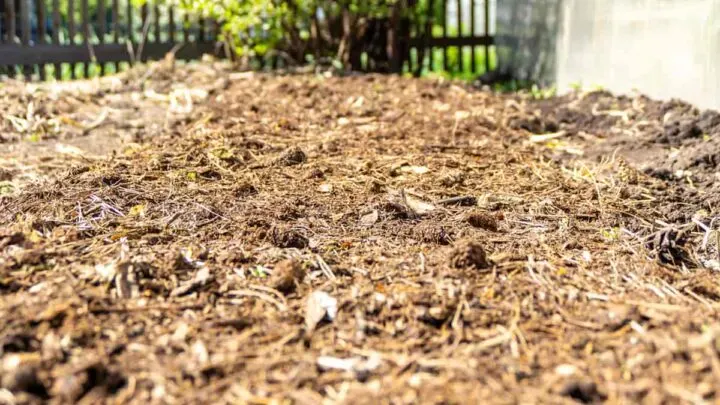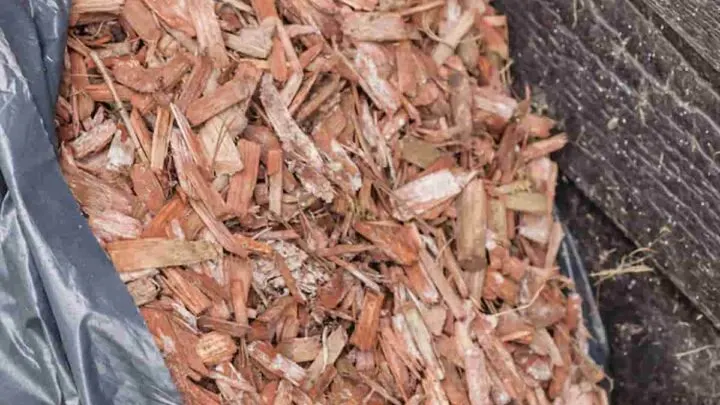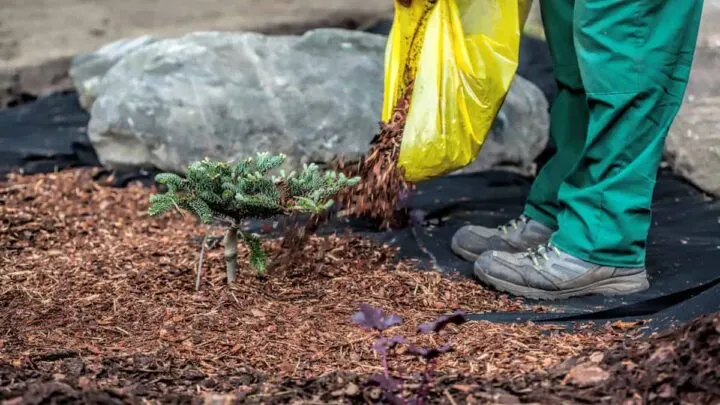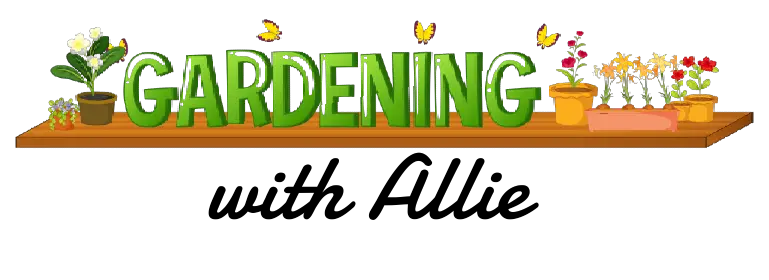Nothing disrupts the beauty of your landscape like unruly weeds creeping and spreading throughout your otherwise immaculate and well-thought-out garden. Since weeds can sprout and spread quickly, overtaking already weeded areas within days, gardeners are always searching for ways to control and prevent them.
Chemical weed killers seem like a natural choice, along with manually pulling each weed as it emerges, but is there an easier way? Perhaps, a way to control weeds for an extended time without using harsh or toxic chemicals? Can you mulch over weeds?
You can mulch over weeds. It is one of the easiest ways to prevent new weeds from sprouting and overtaking your garden, providing a long-lasting solution to your weed problem.
Since mulch comes in a variety of colors and options, there are endless ways to create the weed-less garden of your dreams.

How Do I Prevent Weeds in my Garden?
No one likes weeds in their gardens. Typical options for weeding your garden include:
- Manually pulling the weeds as they emerge.
- Spraying weeds with a natural or homemade weed killer.
- Using a physical barrier.
- Purchasing and spraying a chemical weed killer.
- Using mulch.
Pulling Weeds
Manually pulling weeds requires a lot of physical activity. Depending on how many weeds are rising through your garden space, the process can be long and daunting. Since weeds tend to root, sprout, and grow quickly, you can feel like they return immediately after you finish pulling them up.
Since weed seeds can take a few days to germinate before sprouting, there is never a way to be sure that you have pulled all the weeds from your garden. This process can also be labor intensive. Kneeling or squatting to be close to the weeds in the ground can be hard on your body, and getting the proper leverage to pull out the weeds can make your back and neck sore.
Homemade Weed Killer
When you do not want to commit the time and physical effort to manually pull weeds but do not want to use harsh chemicals that can also harm your garden plants, choosing a natural or homemade weed killer can be an option. The best part is that you probably already have the kitchen ingredients right now.
Homemade weed killer is made of salt, dish soap, vinegar, and water. Simply spray the mixture on the weed you hope to kill, avoiding any surrounding plants to avoid hurting them.
Users say they see the weeds begin to die and diminish within a few hours to a few days. If needed, you can go back through and respray the weeds. Since these ingredients do not contain harmful chemicals, you can use this spray in your vegetable or herb gardens.

Physical Barrier
A surefire way to prevent weeds from becoming a nuisance is using a physical barrier like a landscape sheet. These are specially designed to go under rock or other landscape materials and prevent weeds from rising through them.
Another benefit of landscape sheets is that they are multi-year solutions. Most of the sheets last anywhere from 5-30 years, depending on their rating. When you use a landscape barrier, you first choose the level of intensity.
Lower levels of landscape sheets will be thinner and allow more things to pass through in both directions. These are the cheapest option and only last 3-5 years. The following two levels allow water to get through to the plants but are tougher on weeds.
These last between 10-20 years. A final level lasts 30 years and lets nothing pass in either direction. This level is not for plants in the ground of your garden and is used primarily for hardscapes. Even with a physical barrier, weeds can still emerge. Sometimes weeds will grow outside the barrier sheet as dirt collects on it. However, there will be fewer, and they will be easier to pull out and control.

Chemical Weed Killer
Sometimes chemical weed killer is needed. If you are looking to clear out a large area that has become overgrown or you are hoping to keep your ditch or other areas clear of any foliage, plants, or flowers, getting a ground clear level chemical spray would help.
This spray will kill any plant it comes in contact with, sometimes even small bushes and trees. Do not use this level of spray if you are using it near plants you want to survive. For day-to-day weed control, choose a spray designed especially for weeds and weeds only.
Use a targeted sprayer to spray only the weed you wish to destroy. This helps prevent the chemicals from entering and killing the garden plants. If you plan on eating any of the food from your garden, experts recommend you avoid using harsh chemicals. The chemicals also seep into the soil and can cause soil issues in the future.
Mulch
If none of the earlier methods sound like a good investment to you, rest assured there is another. Using mulch in your garden helps prevent weeds from growing and spreading while adding a put-together look to your landscape. Laying mulch in layers of 2-3 inches high prevents weed seeds from sprouting and growing.
This will also help smother weed seedlings before they emerge fully. Mulch is biodegradable and will need to be replenished every season. Some gardeners or landscapers use mulch over a physical barrier like landscape sheets.
If you want the added benefit of two weed barriers, this is a great option. Remember that if you choose to use the landscape barrier, you must scoop out the old mulch every season before adding more to prevent mold and buildup. The landscape barrier will prevent the mulch from breaking down into the soil.

Mulch comes in a variety of colors. The main color options are black, red, and brown. Depending on your landscape design and house color, choosing a mulch color depends entirely on your taste. There is no benefit to using one over the other.
Be sure to apply the mulch in 2-3 inch thick layers for optimal weed prevention. Mulch also tends to be cheap. You can pick up bags at any local garden center, big box store, or even some gas stations in the summer months.
Mulch also creates a cohesive and complete look to your garden space. To use mulch properly, allow your perennial plants to emerge after the long winter and then mulch around them, leaving some space. If you are planting annuals, plant them and then mulch around them. It is important to leave space between the mulch and the stalk of your plants as this will help prevent rot or stunt their growth.
In Summary
While there are many types of weed preventers and killers, using mulch is a great way to add beauty to your garden. Manually pulling weeds can be labor-intensive, ineffective, and time-consuming.
Both homemade and store-bought weed killers can damage the soil of your garden, harm your other plants, or be ineffective at preventing more weeds from emerging. Using a physical barrier along with mulch creates double protection and prevents weeds underneath the barrier from making it through.
Mulch creates a level of suffocation for the seeds of weeds and prevents them from growing. Brown, black, and red mulch can be found at local garden centers, big box stores, and gas stations, making it attainable and affordable.

Hi there, my name is Allie and welcome to my blog; GareningWithAllie!
Much of what you see written here is just our personal experiences with gardening. Along with the content I write here, there is also a unique collection of gardening topics covered by some of our close friends. I hope you find everything you read here to be helpful, informative, and something that can make your gardening journey the most lovely experience ever! With that said, Happy Gardening!
